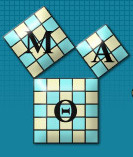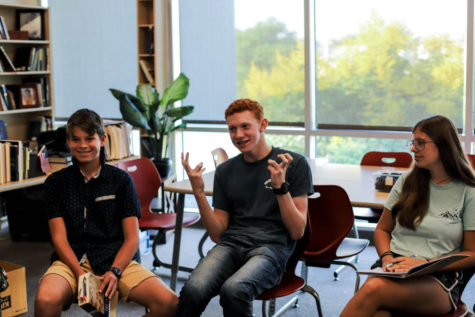Mu Alpha Theta—for Those Who Love Pi!

The Mu Alpha Theta Logo
As the 2016-2017 school year continues, many changes have occurred. New classes, sports and clubs have formed, allowing caimans to seek out what they enjoy and participate in those activities with like-minded individuals. Changes at the school keep the environment interesting and full of new opportunities.
One club that started just this school year is Mu Alpha Theta (MA𝚯), a nationally- recognized math society “dedicated to inspiring a keen interest in mathematics, developing strong scholarship in the subject, [sic] and promoting the enjoyment of mathematics in high school and two-year college students” (mualphatheta.org).
Junior Sarah Sleboda, president and founder of the CAHS MA𝚯 chapter, noticed that “the school had clubs for almost anything. There [are] Christian clubs, there [are] surfing clubs, but we didn’t have any math clubs around the school.”
So Sleboda decided to take the initiative and start the club herself. She believes that MA𝚯 is “a great way to bring a bunch of math nerds together and discuss topics on math.”
Members of their school’s MA𝚯 chapter can meet up with their peers who have similar interests and travel to math competitions. If students do well at the regional competitions, they have the opportunity to reap rewards and scholarships. Sleboda explains that to be accepted into the club, you must be “academically strong … a hard worker and you show dedication. You need to stand out in society.”
At a typical monthly meeting, the MA𝚯 members “practice problems or discuss future competitions or events,” said junior MA𝚯 participate Shane Carlson. Carlson decided to join the club because it “helps me improve my math knowledge and skills.”
Junior Katie Seidel, who has just recently joined MA𝚯, enjoys math “because it makes sense. It’s not like English, where you have to be creative. Math is fact-based.” This affinity for math is what drove Seidel to commit to MA𝚯. Seidel eventually hopes “to meet new people from it and make new friends with similar perspectives.”
Not only can MA𝚯 aid students in their daily lives now, but it can also help to provide the foundation for a future occupation in the STEM field. For example, Sleboda “want[s] to do chemical or material engineering, so having a strong math background is very necessary for the job.”









